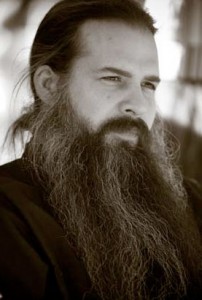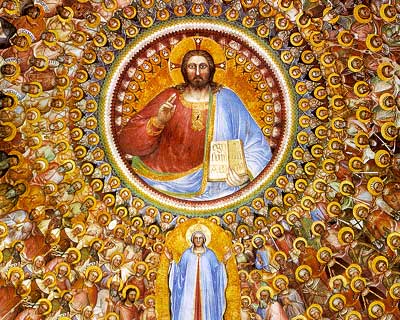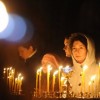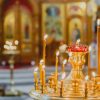“Surrounded by so great a cloud of witnesses”
Having created the context for human activity (the Garden, tending and keeping it, eating and not eating of specific trees), God reveals the primary condition of man’s being and meaning, saying, “It is not good that man should be alone.” We are reminded of this need for companionship most often in the service of the Mystery of Marriage. But the nature of companionship, which is an image of the Holy Trinity’s essence as Persons in perfect union, manifests itself in many ways.
God was pleased to present animals to Adam, and though none were perfectly right for him, that bond between animals and man remains. A little below our companionship with animals is our bond to all of Creation, for which we were given the primary task to “tend and to keep.” That’s why we are happiest (undiscovered by many) with our hands in or near the soil. Hence we are also not environmentalists; we are simply Christians. Supremely above our bond to God’s holy Creation, we have marriage, family, and friends—those relationships of person to person that have the greatest potential to likeness of the Holy Trinity. “Not being alone” is the absolute truth at the root of such virtues as hospitality, trust, loyalty, repentance, forgiveness, and sacrificial love. It is the confidence of him “who has his quiver full, who shall not be put to shame when he speaks with his enemies at the gate” (Psalm 127), and the joy of those who “subdued kingdoms, worked righteousness, obtained promises, stopped the mouths of lions, quenched the violence of fire, escaped the edge of the sword, out of weakness were made strong, became valiant in battle, and turned to flight the armies of the enemy” (Heb. 11:33). True companionship produces young men and women “in whom there is no blemish, but good-looking, gifted in all wisdom, possessing knowledge and quick to understand, [to whom] God gives knowledge and skill in all literature and wisdom” (Daniel 1).
This is the kind of companionship all long for and suffer from the lack of. We are in fact at war, and, in today’s language, we need to know “who has our back.” For the Orthodox Christian, fulfilling this need to know begins with faith and trust in Christ, who “calls us friends” (John 15:15), and reception of the Holy Spirit, the Comforter (in Greek Parakletos: one who consoles, comforts, encourages, and uplifts; an advocate in court). Only through the compassion of Christ and the power of the Holy Spirit do we begin to experience that longed-for companionship and acquire the ability to offer it to others. And we make sure it is real companionship we offer by observing the lives of the saints. We are masters at disguising ego, fear, and self-interest as friendship; but the saints are the real deal. And, in imitation of them, we open ourselves up to the genuine experience of life in Christ. If we are uncomfortable with the saints, we have yet to actually know Christ, the Holy Spirit, and true companionship.
This week alone we celebrate the memory of Maximos the Confessor, the Apostle Timothy, Clement of Ancyra, Xenia of St. Petersburg, Gregory the Theologian, Xenophon and his family, John Chrysostom (lesser feast), Ephrem and Isaac of Syria, and the list goes on. Each one, every one, is a profound and inspiring example of being “in the world but not of it” (John 17:15–16). The saints are those who have cut the path to Paradise ahead of us, cleared it, and made it easier to follow. They are our mentors, our spiritual companions, and our friends. The grace-filled saints journey with us, encourage us, comfort us, embolden us, and advocate for our salvation. They “have our back,” and they teach us how to be true friends, how to support and encourage those around us in a God-pleasing manner.
Along with our morning and evening prayers, we read the lives of the saints because it works. Like going to church, keeping the fast, and resisting sin, it is the exercise that makes us spiritually strong. We don’t have to do these things. But if we don’t, we can’t complain of our spiritual failure. Like a person with unused exercise equipment in the garage, our familiarity with spiritual tools will not compensate for our failure to use them.
So read the lives of the saints. Every day. All year. Every year. They are the actual “cloud of witnesses” (Heb. 12:1) that surrounds us. When we ask them to, they pray for us. When we strive spiritually, they cheer. Like our guardian angel, they are ever present if we nurture our relationship with them; thereby we are never, ever alone. Christ stands at the door of our heart and knocks, the Holy Spirit is in all places and fills all things, and the saints, in likeness to God, accompany us also if we so desire.
Source: St. Lawrence Orthodox Church





















